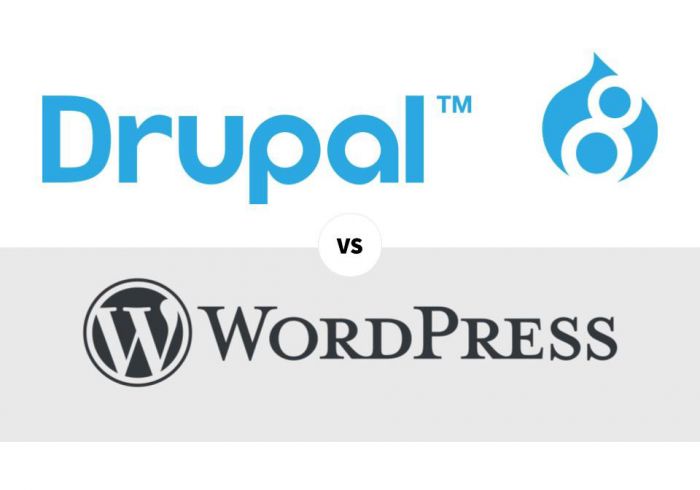Drupal Vs WordPress
At Problue Solutions we are big fans of the Drupal content management system (actually, framework is a better description of Drupal). We consider Drupal to be head shoulders above any other CMS, and the best choice for a new website.
WordPress is hugely popular and accounts for around 40% of all websites on the internet, so naturally we get a lot of potential clients asking why not use WordPress and what are the real differences between WordPress and Drupal.
We have used both Drupal and WordPress to develop websites of varying size and complexity and we have become accustomed to the strengths and weaknesses of both platforms.
WordPress started life as a simple blogging platform and over the years has expanded in features to become a CMS with a large variety of plugins that allow websites to be built that can become fairly complex. At its heart though it is still primarily a blogging platform where all content is a ‘post’. There are various features and plugins that allow more advanced content types, but this all feels like an after-thought as opposed to being designed from the ground up to be more than a blogging platform.
Drupal from its inception was designed around being able to model content in whatever way you desire, it was designed from the ground up to be a framework to develop any kind of website instead of trying to mould the platform into something that it wasn’t originally designed to be.
We find WordPress feels very ‘hacked together’ in many ways, a lot of things can be achieved but a lot of the time work-arounds are required and it feels like we are forcing it to do things it may not be good at. Another area where the cobbled together feeling appears is in settings and configuration. Different plugins and themes place settings in different places which doesn’t really make much sense, there is no standard or correct way of doing things which creates a very unorganised and messy interface.
With Drupal the administrative pages are a lot more intuitive and concise, there is a correct place for things and a correct way for developers to do things. Drupal feels a lot more standardised and more professional, and it encourages websites to be developed in a more professional way.
The separation of front-end and back-end (or lack thereof) is another pain point with WordPress. All good content management systems or website frameworks should provide total separation between the functionality and content (the back-end) of the website and the front-end visual side of the website. With WordPress many themes and plugins do not follow this rule and you will commonly find functionality baked into themes and front-end features baked into plugins which causes all kinds of problems when you want to visually change your website or update some functionality. Drupal keeps a good separation between front-end and back-end which makes the future evolution of your website a lot less painful.
Security of your website is a huge issue no matter whether you are running a massive ecommerce website or just a small five-page business website. On this point there is no contest, Drupal is a far more secure CMS than WordPress provided it is kept up to date. WordPress has a much higher volume of vulnerabilities compared to other popular CMS’s, most of these vulnerabilities are found in the WordPress plugins ecosystem. Drupal is renowned for good security and this is one of the reasons for its popularity with governments and large corporations.
We recently undertook a project to build a website that had to be built with WordPress due to the client’s relationship with another provider. We hadn’t built a WordPress website in a while and we thought this would be a good opportunity to see if WordPress had made any progress in areas where we feel it is weak. We were able to achieve what we needed to and the website looks good and serves its purpose, but that ‘hacked together’ feeling has not gone away.
Every step of the way we felt that Drupal simply does things better. We counted 5 entirely different methods of editing text that were required, that’s 5 completely different and unrelated places within the administrative interface where we had to go to make changes to text that appears on the website. Some of these were within theme configuration and some within content configuration.
This is simply a poorly designed system where core, plugin and theme developers come up with all kinds of different ways to do things instead of just deciding on the best way to do things and developing the system to always do things the best way.
Generally, Drupal feels more intuitive and it makes sense why things are done the way they are. You always have a feeling that the software is doing things the correct way and that makes it feel like a much more professional platform. It feels like any website created with Drupal is going to be more robust than one created with WordPress.
So why aren’t all web designers using Drupal instead of WordPress? The main reason we think is because of some of the very points raised earlier in this post. Because Drupal insists on doing things the correct way, it can be more difficult for a web developer to create a custom module (plugin).
It can also be slightly more time consuming on the site architecture side of things, more thought and planning will go into the process with Drupal, whereas with WordPress a complete novice can knock up a website without much thought or effort. This makes the barrier to entry much lower for WordPress, and therefore a lot more people use it.
We strongly believe that Drupal is a more suitable platform for businesses and professional organisations to build websites. If you would like us to work on your Drupal website, get in touch.





